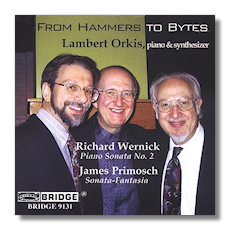
The Internet's Premier Classical Music Source
Related Links
- Latest Reviews
- More Reviews
-
By Composer
-
Collections
DVD & Blu-ray
Books
Concert Reviews
Articles/Interviews
Software
Audio
Search Amazon
Recommended Links
Site News
 CD Review
CD Review
From Hammers to Bytes

Keyboard Music
- Richard Wernick: Piano Sonata #2
- James Primrosch: Sonata-Fantasia for Piano & Synthesizer
Lambert Orkis, piano & synthesizer
Bridge 9131 76:33
Summary for the Busy Executive: Hard.
I must admit my uncertainty as to whether I would review this. Some composers welcome you. Others brandish quills. Richard Wernick and James Primosch fall into the porcupine genus. Furthermore, both works require attentive stamina. Wernick's sonata lasts about 35 minutes (you can figure out for yourself how long the Primosch lasts). Wernick taught Primosch, so no real surprise there. At any rate, I kept listening over about two weeks, in various moods. Sometimes I initially couldn't stand what I was hearing, but then something would grab me. Always, however, Lambert Orkis's playing impressed me no end. I shudder to think how these works would have fared with a lesser pianist. Both Wernick and Primosch might be described as "composers' composers," although most of the composers I know probably don't listen to them out of choice. In fact, I can think of only two people in my circle of acquaintance who would definitely enjoy them. However, I mean merely that a composer would very likely appreciate their art. In any case, eventually Orkis won me over to their cause.
Wernick studied with Toch, Kirchner, Irving Fine, and Arthur Berger. Although I can't prove that he writes dodecaphonically, the music sure sounds that way to me. I would also claim that certain Schoenbergian habits of structural thinking have influenced him, as well as a lyricism ultimately traceable, I think, to Berg. There's little memorable, however, about the idiom, which comes over like many other twelve-tone composers. Instead, we get to spend time with a passionate, rigorous mind. There are all kinds of motific connections among the three movements of the sonata: a tripartite first movement (march, arioso, toccata), a "fantasy variations" second movement, and a tripartite third movement (toccata, arioso, march – a kind of palindrome of the opening movement). The music gives off a tremendous exploratory quality I also find in Beethoven's Op. 110, a fearlessness in the face of music breaking down and starting again, a faith in one's ability to almost, but not quite, drop the threads and not only recover, but make the music even more cohesive. Also, Wernick's emphasis on effortlessly independent counterpoint means Op. 110 to me. Unlike many players of contemporary music, Orkis conveys not only the unity of the work, but its drama. The performance that lets a mere civilian like me inside, that allows me to listen to this piece as I would listen to Brahms or to Beethoven. Very rare. The more I was able to listen, the more the music and the eminence of Wernick's thinking took hold of me. The inventiveness, the variety, the richness, and the suitability of Wernick's piano textures gave me particular pleasure. This composer profoundly understands not only the capability, but the soul of the instrument.
In contrast, Primosch's Sonata-Fantasia is more accessible and less austere. Primosch appears as one of those people whose mind is a messy office, but who can put his hands on any piece he needs to. "Accessible" is, of course, a relative term. I'm sure Primosch can turn off lots of listeners all on his own. However, his idiom is slightly less granitic than Wernick's, and he reveals a rather daffy sense of humor. Like Wernick, he has a terrific ear for sonority, in this case the interplay between a concert grand and a Kurzweil (Orkis plays both, at times both at once). The electronic sounds always seem to "grow out of" or "go with" piano sonorities, and they're beautiful in their own right. The first movement is a massive variation structure longer than some complete sonatas. One can grasp the theme with little trouble. However, Primosch sometimes drops the theme and varies some of the subsidiary ideas of previous variations. His sense of contrast is sharp enough to be nearly Manichean, and this works against the long architectural span important to Wernick. However, you don't really miss it. The inventiveness of the variations carries you along. Primosch also comes up with fewer new keyboard textures than Wernick. Indeed, he makes homage to various master composers of the piano: Chopin, Liszt, Beethoven, Webern (ok, I stretch the point), and so on. The slow second movement, based on choral music Primosch composed soon after his father's death, is incredibly beautiful. Here, the Kurzweil carries more of the expressive burden. It manages serenity and lament at the same time. The allegro finale, "Daddy-O's New Groove," takes off from Bernstein's evocations of jazz (some of it put me in mind of the "Cool" fugue from West Side Story). At this point, however, the sonata as a complete musical object hasn't solidified in my mind. The finale, delightful in itself, especially doesn't seem to fit in yet with the other two movements. Perhaps repeated listenings will clarify its place in the rhetorical structure.
As I say, Orkis does these things so well, I don't even think of them as new music, but as music. It couldn't have been easy. What a terrific player.
Copyright © 2008, Steve Schwartz




















